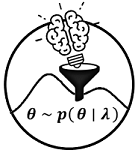# noqa SPDX-FileCopyrightText: 2024 Florence Bockting <florence.bockting@tu-dortmund.de>
#
# noqa SPDX-License-Identifier: Apache-2.0
import tensorflow as tf
import tensorflow_probability as tfp
import bayesflow as bf
tfd = tfp.distributions
bfn = bf.networks
[docs]
def compute_loss_components(elicited_statistics):
"""
Computes the single loss components used for computing the discrepancy
between the elicited statistics. This computation depends on the
method as specified in the 'combine-loss' argument.
Parameters
----------
elicited_statistics : dict
dictionary including the elicited statistics.
glob_dict : dict
dictionary including all user-input settings.
expert : bool
if workflow is run to simulate a pre-specified ground truth; expert is
set as 'True'. As consequence the files are saved in a special 'expert'
folder.
Returns
-------
loss_comp_res : dict
dictionary including all loss components which will be used to compute
the discrepancy.
"""
# extract names from elicited statistics
name_elicits = list(elicited_statistics.keys())
# prepare dictionary for storing results
loss_comp_res = dict()
# initialize some helpers for keeping track of target quantity
target_control = []
i_target = 0
eval_target = True
# loop over elicited statistics
for i, name in enumerate(name_elicits):
# get name of target quantity
target = name.split(sep="_")[-1]
if i != 0:
# check whether elicited statistic correspond to same target
# quantity
eval_target = target_control[-1] == target
# append current target quantity
target_control.append(target)
# if target quantity changes go with index one up
if not eval_target:
i_target += 1
# extract loss component
loss_comp = elicited_statistics[name]
assert tf.rank(loss_comp) <= 2, "elicited statistics can only have 2 dimensions." # noqa
if tf.rank(loss_comp) == 1:
# add a last axis for loss computation
final_loss_comp = tf.expand_dims(loss_comp, axis=-1)
# store result
loss_comp_res[f"{name}_loss"] = final_loss_comp
else:
loss_comp_res[f"{name}_loss_{i_target}"] = loss_comp
return loss_comp_res
[docs]
def compute_discrepancy(loss_components_expert, loss_components_training,
targets):
"""
Computes the discrepancy between all loss components using a specified
discrepancy measure and returns a list with all loss values.
Parameters
----------
loss_components_expert : dict
dictionary including all loss components derived from the
expert-elicited statistics.
loss_components_training : dict
dictionary including all loss components derived from the model
simulations. (The names (keys) between loss_components_expert and \
loss_components_training must match)
glob_dict : dict
dictionary including all user-input settings.
Returns
-------
loss_per_component : list
list of loss value for each loss component
"""
# create dictionary for storing results
loss_per_component = []
# extract expert loss components by name
keys_loss_comps = list(loss_components_expert.keys())
# compute discrepancy
for i, name in enumerate(keys_loss_comps):
# import loss function
loss_function = targets[i]["loss"]
# broadcast expert loss to training-shape
loss_comp_expert = tf.broadcast_to(
loss_components_expert[name],
shape=(
loss_components_training[name].shape[0],
loss_components_expert[name].shape[1],
),
)
# compute loss
loss = loss_function(loss_comp_expert, loss_components_training[name])
loss_per_component.append(loss)
return loss_per_component
[docs]
def compute_loss(
training_elicited_statistics, expert_elicited_statistics, epoch, targets
):
"""
Wrapper around the loss computation from elicited statistics to final
loss value.
Parameters
----------
training_elicited_statistics : dict
dictionary containing the expert elicited statistics.
expert_elicited_statistics : dict
dictionary containing the model-simulated elicited statistics.
global_dict : dict
global dictionary with all user input specifications.
epoch : int
epoch .
Returns
-------
total_loss : float
total loss value.
"""
# regularization term for preventing degenerated solutions in var
# collapse to zero used from Manderson and Goudie (2024)
def regulariser(prior_samples):
"""
Regularizer term for loss function: minus log sd of each prior
distribution (priors with larger sds should be prefered)
Parameters
----------
prior_samples : tf.Tensor
samples from prior distributions.
Returns
-------
float
the negative mean log std across all prior distributions.
"""
log_sd = tf.math.log(tf.math.reduce_std(prior_samples, 1))
mean_log_sd = tf.reduce_mean(log_sd)
return -mean_log_sd
def compute_total_loss(epoch, loss_per_component, targets):
"""
applies dynamic weight averaging for multi-objective loss function
if specified. If loss_weighting has been set to None, all weights
get an equal weight of 1.
Parameters
----------
epoch : int
curernt epoch.
loss_per_component : list of floats
list of loss values per loss component.
global_dict : dict
global dictionary with all user input specifications.
Returns
-------
total_loss : float
total loss value (either weighted or unweighted).
"""
# loss_per_component_current = loss_per_component
# TODO: check whether order of loss_per_component and target quantities
# is equivalent!
total_loss=0
# create subdictionary for better readability
for i in range(len(targets)):
total_loss += tf.multiply(
loss_per_component[i], targets[i]["weight"]
)
return total_loss
loss_components_expert = compute_loss_components(
expert_elicited_statistics
)
loss_components_training = compute_loss_components(
training_elicited_statistics
)
loss_per_component = compute_discrepancy(
loss_components_expert, loss_components_training, targets
)
weighted_total_loss=compute_total_loss(epoch, loss_per_component, targets)
return (weighted_total_loss, loss_components_expert,
loss_components_training, loss_per_component)
[docs]
def L2(loss_component_expert, loss_component_training,
axis=None, ord="euclidean"):
"""
Wrapper around tf.norm that computes the norm of the difference between
two tensors along the specified axis.
Used for the correlation loss when priors are assumed to be independent
Parameters
----------
correlation_training : A Tensor.
axis : Any or None
Axis along which to compute the norm of the difference.
Default is None.
ord : int or str
Order of the norm. Supports 'euclidean' and other norms
supported by tf.norm. Default is 'euclidean'.
"""
difference = tf.subtract(loss_component_expert,
loss_component_training)
norm_values = tf.norm(difference, ord=ord, axis=axis)
return tf.reduce_mean(norm_values)
[docs]
class MMD2:
[docs]
def __init__(self, kernel : str = "energy", sigma : int or None = None,
**kwargs):
"""
Computes the biased, squared maximum mean discrepancy
Parameters
----------
kernel : str
kernel type used for computing the MMD such as "gaussian", "energy"
The default is "energy".
sigma : int, optional
Variance parameter used in the gaussian kernel.
The default is None.
**kwargs : keyword arguments
Additional keyword arguments.
"""
self.kernel_name = kernel
self.sigma = sigma
[docs]
def __call__(self, x, y):
"""
Computes the biased, squared maximum mean discrepancy of two samples
Parameters
----------
x : tensor of shape (batch, num_samples)
preprocessed expert-elicited statistics.
Preprocessing refers to broadcasting expert data to same shape as
model-simulated data.
y : tensor of shape (batch, num_samples)
model-simulated statistics corresponding to expert-elicited
statistics
Returns
-------
MMD2_mean : float
Average biased, squared maximum mean discrepancy between expert-
elicited and model simulated data.
"""
# treat samples as column vectors
x = tf.expand_dims(x, -1)
y = tf.expand_dims(y, -1)
# Step 1
# compute dot product between samples
xx = tf.matmul(x, x, transpose_b=True)
xy = tf.matmul(x, y, transpose_b=True)
yy = tf.matmul(y, y, transpose_b=True)
# compute squared difference
u_xx = self.diag(xx)[:,:,None] - 2*xx + self.diag(xx)[:,None,:]
u_xy = self.diag(xx)[:,:,None] - 2*xy + self.diag(yy)[:,None,:]
u_yy = self.diag(yy)[:,:,None] - 2*yy + self.diag(yy)[:,None,:]
# apply kernel function to squared difference
XX = self.kernel(u_xx, self.kernel_name, self.sigma)
XY = self.kernel(u_xy, self.kernel_name, self.sigma)
YY = self.kernel(u_yy, self.kernel_name, self.sigma)
# Step 2
# compute biased, squared MMD
MMD2 = tf.reduce_mean(XX, (1,2)) - 2*tf.reduce_mean(XY, (1,2)) + tf.reduce_mean(YY, (1,2))
MMD2_mean = tf.reduce_mean(MMD2)
return MMD2_mean
[docs]
def clip(self, u):
u_clipped = tf.clip_by_value(u, clip_value_min=1e-8,
clip_value_max=int(1e10))
return u_clipped
[docs]
def diag(self, xx):
diag = tf.experimental.numpy.diagonal(xx, axis1=1, axis2=2)
return diag
[docs]
def kernel(self, u, kernel, sigma):
if kernel=="energy":
# clipping for numerical stability reasons
d=-tf.math.sqrt(self.clip(u))
if kernel=="gaussian":
d=tf.exp(-0.5*tf.divide(u, sigma))
return d

